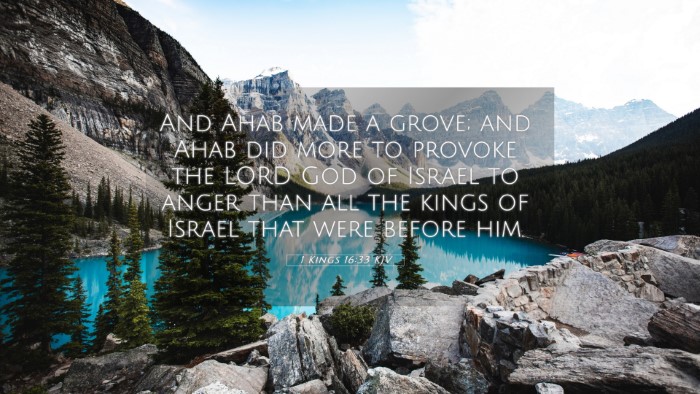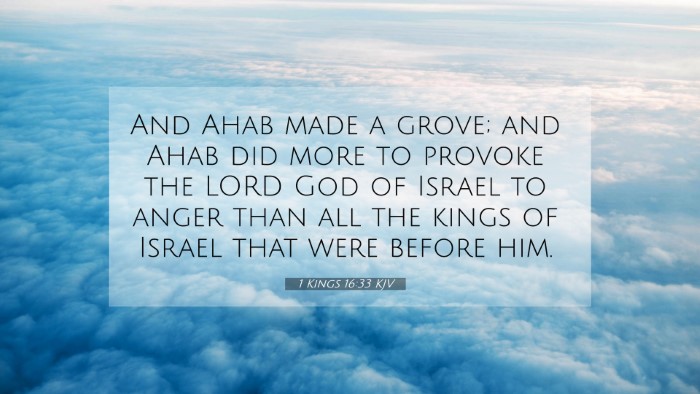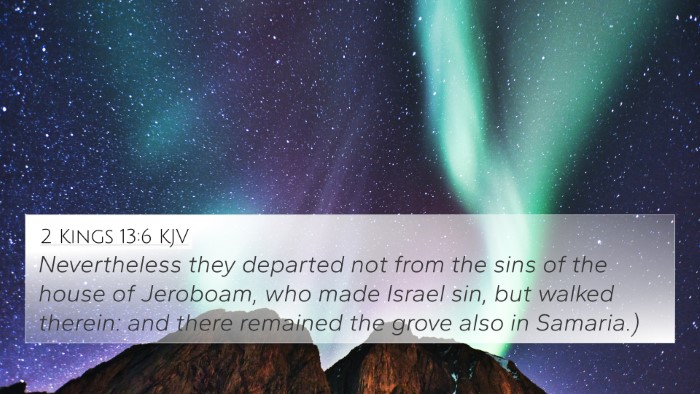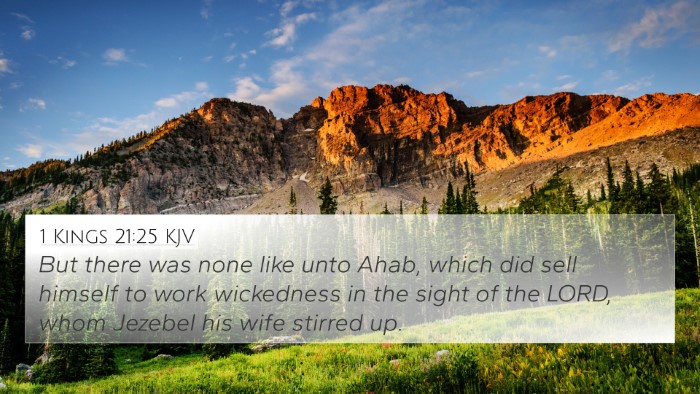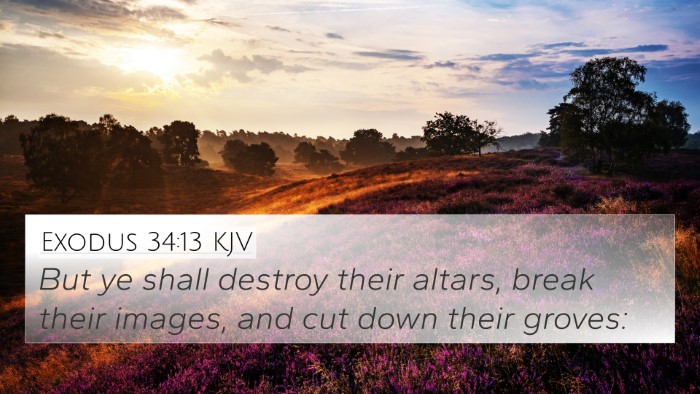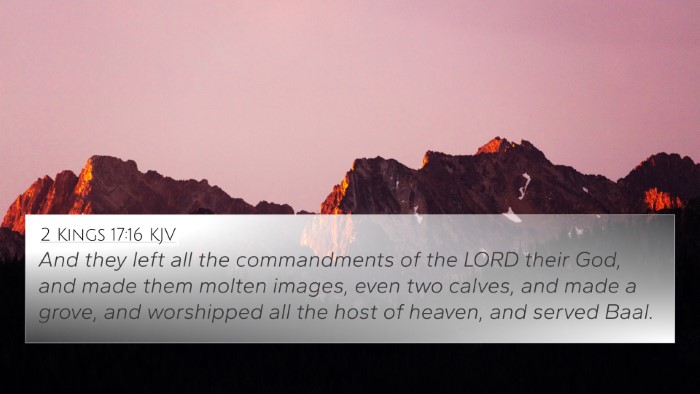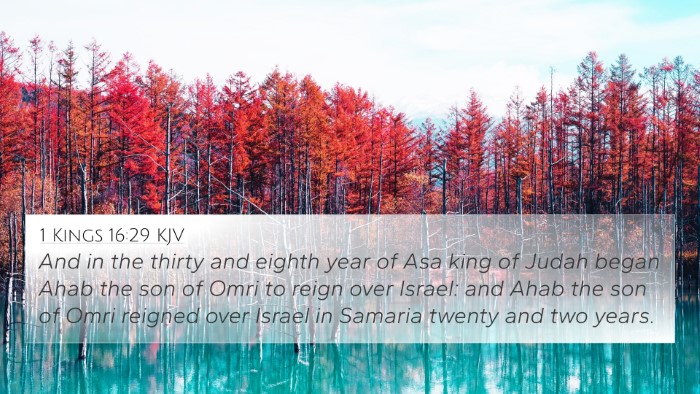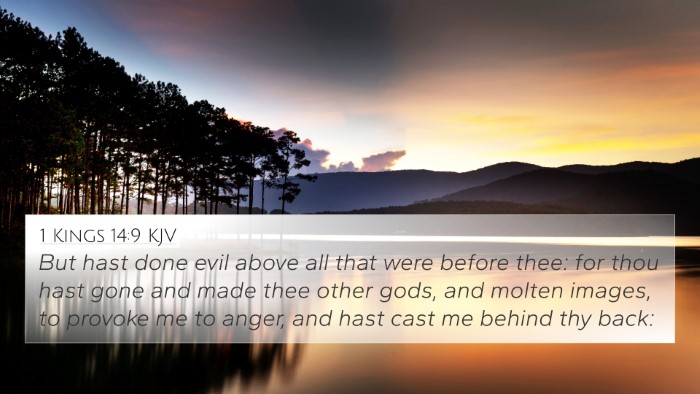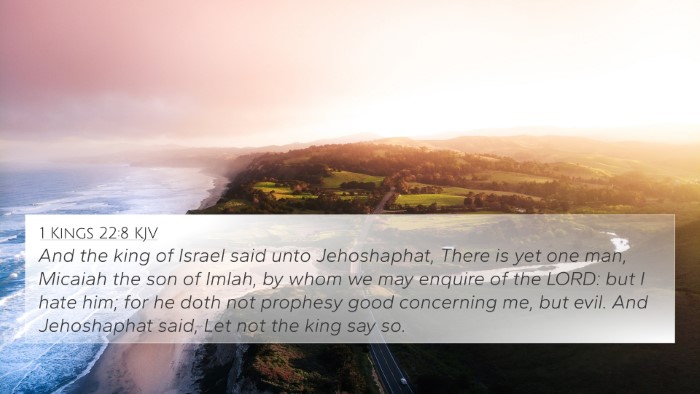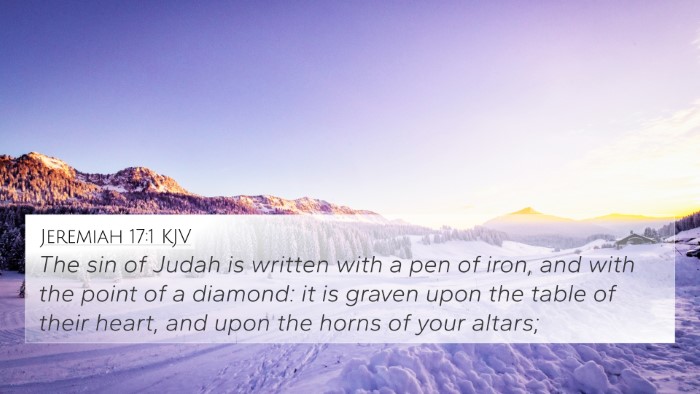Meaning and Interpretation of 1 Kings 16:33
Verse: "And Ahab made a grove; and Ahab did more to provoke the LORD God of Israel to anger than all the kings of Israel that were before him." (1 Kings 16:33)
Context and Overview
The verse occurs during the reign of King Ahab of Israel, a figure often noted for his significant idolatrous practices. This statement draws attention to Ahab's actions against the backdrop of Israel's history, indicating a crescendo of sin among Israel's kings.
Combined Insights from Public Domain Commentaries
This section synthesizes interpretations from Matthew Henry, Albert Barnes, and Adam Clarke.
Matthew Henry's Commentary
Henry notes that Ahab's establishment of worship for Baal and Asherah (the grove) exemplifies his deep-seated rebellion against God. By provoking the Lord more than any king before him, Ahab reflects a significant moral and spiritual decline. His actions serve as a warning against idolatry and the neglect of God’s commandments, indicating the serious implications of turning away from divine truth.
Albert Barnes' Commentary
Barnes highlights the deliberate nature of Ahab's sin, emphasizing that it was willfully done and that his actions were not merely lapses but a conquest of evil. His building of a grove emphasizes a public embrace of pagan worship, which leads Israel further away from covenant loyalty, resulting in dire consequences for both Ahab and the nation.
Adam Clarke's Commentary
Clarke discusses the historical context of Ahab’s reign, scrutinizing his marriage to Jezebel, a Phoenician princess. This marriage not only solidifies Ahab's evil influence but serves to establish the Baal worship that he institutionalizes. Clarke indicates that Ahab’s actions reflect a historical culmination of apostasy which invites God's judgment upon Israel.
Bible Cross-References
- 1 Kings 12:28-30: The worship of the golden calves established by Jeroboam, illustrating Israel's ongoing rejection of God.
- 2 Kings 21:16: Represents the continued evil of subsequent kings and their influence on Israel's spiritual state.
- Jeremiah 32:35: God's lament regarding the idolatrous practices in Judah and Israel.
- 1 Kings 18:21: Elijah's challenge to the people about choosing between the Lord and Baal echoes the consequences of Ahab’s reign.
- 2 Chronicles 33:9: Highlights further apostasy by contrasting Ahab with those who led Israel back to God.
- Amos 2:4-5: Reflects God’s judgment against Israel for rejecting His commandments and embracing pagan practices.
- Revelation 2:14: Discussion of Balaam, connecting with the idolatry prominently seen during Ahab's reign.
Significance of Ahab's Actions
Ahab's actions serve as a religious and moral benchmark throughout the Old Testament narrative. His reign is marked by an escalated interference of idolatry, showcasing a shift that not only impacts his rule but sets a trajectory for Israel’s decline and eventual exile.
Thematic Connections
This verse invites thematic connections across the Biblical text, particularly themes of idolatry, divine judgment, and leadership's influence on national morality. Key scriptures that touch on these themes include:
- Exodus 20:4-5: The Second Commandment against idolatry, linking directly to Ahab's practices.
- Isaiah 44:9-20: The futility of idol-making and worship linked to Ahab's leading of Israel into sin.
- Romans 1:21-23: New Testament reflections on idolatry and the consequences of rejecting God, paralleling the warnings from Ahab's era.
Inter-Biblical Dialogue
This verse creates an inter-Biblical dialogue illustrating how the actions of Ahab reverberate through both the Old and New Testaments. By examining the connections and consequences of idolatry, themes identified in 1 Kings 16 redefine our understanding of God’s nature and the seriousness with which He regards worship. Ahab’s story is pivotal for both historical and moral lessons within scripture.
Conclusion
1 Kings 16:33 is more than a historical note; it is a profound lesson on the cost of turning away from God. Ahab's reign becomes a definitive moral lesson, reminding readers of the destructive nature of sin and the importance of remaining faithful to God’s commands. This passage encourages a comprehensive Bible cross-reference study to better understand the biblical themes of idolatry and leadership, drawing connections between earlier and later texts.
Tools for Further Study
For deeper exploration, consider utilizing:
- Bible concordance for locating similar themes and verses.
- Bible cross-reference guides to navigate connections between related scriptures.
- Cross-reference Bible study methods to develop a better understanding of biblical context.
By employing these tools, one can engage more fully with the stories of scripture, uncovering the depth of meaning contained in verses such as 1 Kings 16:33.

